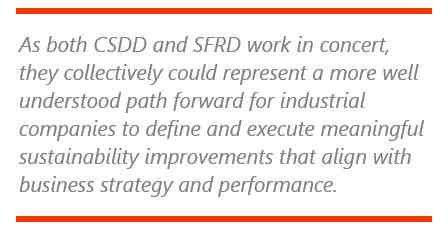

Sustainability performance for industrial companies continues to be a front-and-center business strategy issue. In February of this  year, the European Union (EU) announced a proposal to implement Corporate Sustainability Due Diligence (CSDD) aimed at large companies, as well as their partners and supply chains. The rules in the proposal aim at curbing and eliminating both negative social and environmental impacts from these organizations. These due diligence requirements go into effect on October 1, 2022, with a two-year window for implementation under national laws within EU membership.
year, the European Union (EU) announced a proposal to implement Corporate Sustainability Due Diligence (CSDD) aimed at large companies, as well as their partners and supply chains. The rules in the proposal aim at curbing and eliminating both negative social and environmental impacts from these organizations. These due diligence requirements go into effect on October 1, 2022, with a two-year window for implementation under national laws within EU membership.
The companies falling within these requirements must average more than 500 employees and €150 million in annual worldwide revenue. From ARC’s perspective, particularly when considering the impact on our industrial client base, two key issues stand out:
In March of 2021, the EU also made effective the Sustainable Finance Disclosure Regulation (SFDR), which it adopted in 2019, along with additional low-carbon regulatory measures. The aim of the SFDR was to attach sustainability to financial market participation, effectively using investment as a lever by requiring financial asset managers to report on how environmental, social, and governance (ESG) goals have been incorporated at the corporate and product levels.
A year in, SFDR compliance has led to criticism by many of greenwashing by financial asset managers and impacted industrial companies. Reporting requirements are often identified by detractors as vague and imprecise. This muddiness has allowed many industrial companies a good deal of leeway on what is measured, and more importantly, excluded in reporting.
Adding an additional layer in CSDD, with its emphasis on identification, prevention, and mitigation, is a considerable step to ensure improvements in sustainability. As it becomes rooted within industrial business strategy, it will also likely tighten the veracity of SFRD compliance, shutting down further avenues for loopholes in reporting. As both CSDD and SFRD work in concert, they collectively could represent a more well understood path forward for industrial companies to define and execute meaningful sustainability improvements that align with business strategy and performance.
ARC Advisory Group clients can view the complete report at ARC Client Portal
If you would like to buy this report or obtain information about how to become a client, please Contact Us
Keywords: Industrial Sustainability, Due Diligence, Energy Transition, Environmental, Social, Governance (ESG), Business Strategy, Financial Disclosure, ARC Advisory Group.

